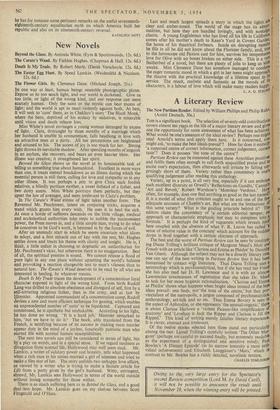. New Novels The Flower Girls. By Clemence Dane. (Michael
Joseph. 21s.) IN one way at least, human beings resemble photographic plates. Expose us to too much light, and our world is darkened. Give us too little, or light of the wrong kind, and our response can seem scarcely human. Only the saint or the mystic can bear excess of light; and the world is apt to react violently against both. At best, It will seek to 'cure' them, as in Chekhov's story 'The Black Monk,' where the hero, deprived of his ecstasy by sedatives, is miserable until vision and death release him.
Miss White's novel envisages a young woman deranged by excess of light. Clara, distraught by three months of a marriage which her husband is unable to consummate, falls headlong in love with an attractive man at a party. All her perceptions are heightened and attuned to his. The access of joy is too much for her. Strong light throws its inevitable shadow. After spending months of anguish In an asylum, she recovers, and bears an even heavier blow. Her Illness was creative; it strengthened her spirit.
Beyond the Glass shows us the novel at its honourable task of telling us something true about humankind. Excellent in more ways than one, it treats mental breakdown as an illness during which the essential person is still there, calling for love and sympathy as in any other illness. It was perhaps a pity to give Clara such foolish relatives, a blindly partisan mother, a sweet fathead of a father, and two dotty aunts. Miss White portrays them perfectly, but they upset the law of averages, and seem irrelevant to Clara's problem. In The Curate's Warid extess of light takes another form. The Reverend Mr. Peachment, intent on conjuring tricks, acquires a wand which grants him every wish. He uses it to heal the sick. At once a horde of sufferers descends on the little village, medical and ecclesiastical authorities take steps to nobble the inconvenient power, the Press moves in, and a little simple man, trying to do what he conceives to be God's work, is hemmed in by the forces of evil.
After an unsteady start in which he seems uncertain what idiom to adopt, and a first miracle out of key with the rest, Mr. Hughes settles down and treats his theme with clarity and insight. He is, I think, a little unfair in choosing so dogmatic an authoritarian for Mr. Peaclunent's vicar, but otherwise there is no exaggeration. Best of all, the spiritual premiss is sound. We cannot release a flood of pure light in any one place without upsetting the world's balance and provoking a reaction chargeable less to man's vileness than to natural law. The Curate's Wand deserves to be read by all who are interested in healing, by whatever means.
Death Is My Trade traces the development of a conscientious loyal character exposed to light of the wrong kind. From birth Rudolf Lang was drilled to absolute obedience and disregard of self, first by a Self-torturing religious father, then in the army, and at last by Ijlmsnler. Appointed commandant of a concentration camp, Rudolf devises a new and more efficient technique for gassing, which enables an unprecedented number of 'units' to be liquidated. Captured and condemned, he is apathetic but unshakable. According to his light, he has done no wrong. 'It is a hard job,' Himmler remarked to him, 'but we have to do it' The book, ably translated from the French, is terrifying because of its success in making mass murder appear duty in the mind of a joyless, fanatically patriotic man who started life with normal human susceptibilities.
The next two novels can still be considered in terms of light, but by a play on words, and in a special sense. If we regard madness as divagation from normal life, Hollywood may well seem mad. Mr. Larnkin, a writer of salutary power and honesty, tells what happened when a rich man in his sixties married a girl of nineteen and tried to make a film star of her. The story unfolds two unhappy love affairs, as viewed by a writer who is trying to make a feature article for We from a party given by the girl's husband. Witty, astringent, shrewd, Mr. Lamkin sees Hollywood in terms of the world outside without losing sympathy for those within. There is as Much suffering here as in Behind the Class, and a good deal-less hope. Mr. Lamkin goes on my shelves between Scott Fitzgerald and O'Hara. Last and much largest spreads a story in which the light so clear and amber-toned. The world of the stage has its at ne malities, but here they are handled lovingly, and with nostalgic charm. A young Englishman who has lived all his life in Californi° comes after his mother's death to Kean's Yard in Covent Garde" the home of his theatrical forbears. Inside six disrupting mc riths he fills in all he did not know about the Florister family, and, tru° to the horoscope old Paxton cast for him, survives his tempestuous love for Olive with no bones broken on either side. This is a vasi featherbed of a novel, but there are plenty of jolts to keen us WO awake. Miss Clemence Dane has somehow managed to cornb0. the eager romantic mood in which a girl in her teens might approach the theatre with the practical knowledge of a lifetime spent in service. The result, realistic and fantastic as the moods of its characters, is a labour of love which will make many readers he PPY'
L. A. 0. STROO


































































 Previous page
Previous page